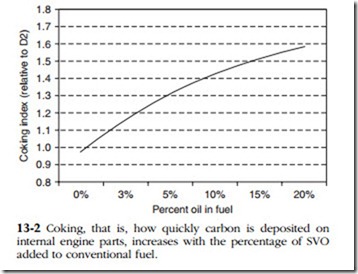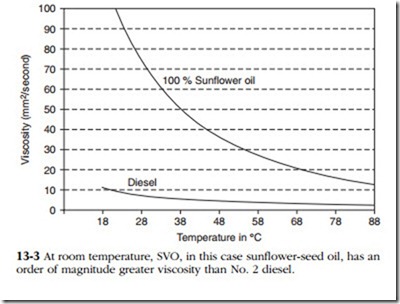It is possible to operate diesel engines on straight vegetable oil (SVO) on the model of the Vila Soledade palm-oil project. Rudolf Diesel’s first commercial engines, one of which was demonstrated at the 1900 Paris World Fair, ran on straight peanut oil. The inventor, who had no love for oil companies, wanted farmers to be able to produce their own fuel. Even after it became clear that SVO could not compete with cheap petroleum, Diesel struggled for years to adapt his engines to run on coal dust.
Rapid increases in oil prices during the 1970s sparked a new interest in SVOs in Europe. A leading figure in this movement was Ludvid Elsbett (1913–2003), an engi- neer of remarkable talent who held more than 400 patents. In 1937 he was hired as a department manager for Junkers Motorenwerke AG, with responsibilities for the gasoline direct injection system used in the Jumo 211 engine that powered the JU- 87, JU-88, and other military aircrafts. As a point of interest, the DI system consisted of 1575 individual parts, many of them precision lapped.3 After the war he was employed by the truck manufacturer MAN and, during the 1970s led an abortive attempt to adapt alternative fuels to diesels in Brazil.
Subsequently, Elsbett and his sons opened a shop in Bavaria that became the first, if not the only, commercial source of SVO automobile engines.
Thousands of enthusiasts, working from information on the Internet, have con- verted their cars and light trucks to burn SVO. The type of oil used is determined by price and availability. Rape-seed oil is favored in Europe and sunflower-seed oil in this country. Many of these enthusiasts run their cars on waste cooking oil, unprocessed except for filtration.
But SVO is not without problems. One of the most intractable is the way veg- etable oil carbons over injectors and combustion chambers. Figure 13-2 graphs the coking effects of sunflower oil against No. 2 diesel. Note that carbon deposits increase almost linearly with the amount of SVO mixed with diesel. This imposes a fairly severe maintenance requirement and, even with frequent de-carbonization, does not obviate the possibility of reduced engine life due to skewed nozzle spray patterns and contaminated lube oil.
Straight vegetable oil also presents a viscosity problem at low temperatures. As shown in Fig. 13-3 sunflower oil is an order of magnitude more viscous than No. 2 diesel at 18°C. The high viscosity of SVO is enough to make it an outlaw fuel, unrecognized by diesel manufacturers and government agencies. People who use the fuel mitigate the viscosity with heat and by mixing the SVO with diesel, alcohol, and even gasoline. SVO also attacks seals, hoses, and other elastomer parts.
The best candidates for conversion are older, IDI engines with Bosch PE-type inline pumps and pintle injectors. The pumps are nearly indestructible and the injec- tors can be easily disassembled for cleaning. Distributor-type injector pumps should be avoided, since lubrication is entirely fuel dependent and electronic versions of these pumps cut off fuel delivery during coastdown. There have been reports that the alcohol present in FAME de-laminates the internal timing sensor (the sensor that tracks pump-cam position relative to the engine camshaft) on Bosch PV44 radial- piston pumps.
Most SVO conversions use conventional diesel fuel for starting and have a second tank, heated by engine coolant, for vegetable oil. A thermostatically con- trolled resistance heater at the suction side of injector pump takes some of the strain off the pump. Manually controlled glow plugs can remain energized until engine temperatures stabilize.

